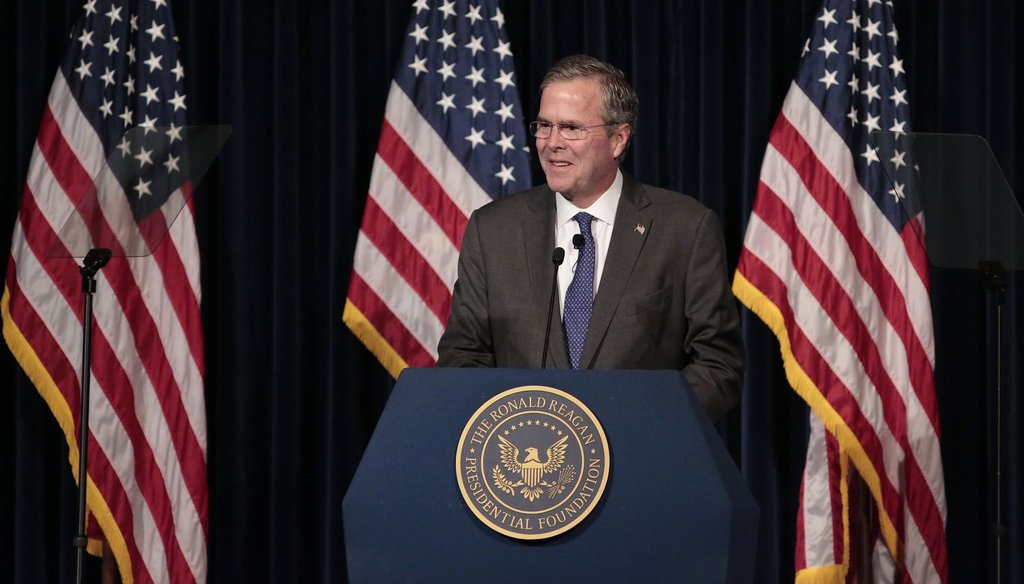Stand up for the facts!
Our only agenda is to publish the truth so you can be an informed participant in democracy.
We need your help.
I would like to contribute

Republican presidential candidate Jeb Bush speaks at the Ronald Reagan Presidential Library in Simi Valley, Calif., on Aug. 11, 2015. (Getty Images)
In a major foreign policy speech this week, Jeb Bush forcefully argued that the current problems in Iraq -- especially increasing violence and the rise of the Islamic State -- are due to President Barack Obama, supported by his former secretary of state, Hillary Clinton.
That argument forecasts Bush’s hopes of being the Republican nominee who takes on Clinton and the Democrats in November 2016.
But Bush’s look back at U.S. failures in Iraq doesn’t tell the whole story. A review by PolitiFact shows he leaves out some key turning points.
"Why was the success of the surge followed by a withdrawal from Iraq, leaving not even the residual force that commanders and the joint chiefs knew was necessary?" Bush asked. "That premature withdrawal was the fatal error, creating the void that ISIS moved in to fill – and that Iran has exploited to the full as well. ISIS grew while the United States disengaged from the Middle East and ignored the threat."
That’s a very selective reading of the facts about Iraq. First of all, we know the timetable to leave was in place when Obama took office. We also know elements of ISIS existed long before the U.S. troop withdrawal, all the way back to when President George W. Bush launched the Iraq war. Finally, Clinton’s role isn’t nearly as clear-cut as Jeb Bush suggested.
Sign up for PolitiFact texts
Troop withdrawal
Bush has repeatedly said Obama pulled out of Iraq unnecessarily.
"We had an agreement that the president could have signed that would have kept 10,000 troops, less than we have in Korea, that could have created the stability that would have allowed for Iraq to progress," Bush said in May. We rated that claim Mostly False.
The so-called Status of Forces Agreement to which he was referring was created in 2008, before Obama took office. President George W. Bush and then-Iraqi Prime Minister Nouri al-Maliki agreed U.S. forces would leave the country by the end of 2011. There were no stipulations about leaving a certain number of troops in Iraq beyond then, although negotiators assumed a new agreement would be hammered out when the old one expired.
Obama, who during his 2008 presidential campaign made promises to end the war, kept the timeline George W. Bush and al-Maliki settled upon. The Pentagon and military leaders in Baghdad wanted as many as 24,000 troops to remain as a residual force, but the White House rejected that number as too high.
The number became moot, however, because the Iraqis and the Americans couldn’t come to an agreement on having U.S. forces in Iraq. A major diplomatic roadblock was Washington’s insistence that U.S. troops be immune from Iraqi law. That prevented a new Status of Forces Agreement from being reached -- an account reinforced this week by retiring Gen. Ray Odierno, a former commander of U.S. forces in Iraq.
Odierno told DefenseOne.com that "us leaving at the end of 2011 was negotiated in 2008 by the Bush administration. That was always the plan." As for whether the Iraqi parliament would have agreed to U.S. terms, "I don’t know if we could have convinced them to do that or not," he said.
Experts still debate whether the U.S. or the Iraqi side was more intractable. The end result was that neither side wanted to keep troops in Iraq.
Origin of ISIS
It wasn’t until after American forces left at the end of 2011 that ISIS grew into the threat the group is today. But the precursor to ISIS was certainly already there.
Jeb Bush has said that "ISIS didn’t exist when my brother was president. Al-Qaida in Iraq was wiped out when my brother was president." We rated that statement Mostly False.
The roots of ISIS actually go back to 2004, when a Sunni extremist named Abu Mus’ab al-Zarqawi established Al-Qaida in Iraq. The National Counterterrorism Center said al-Zarqawi’s group was also known as the Islamic State of Iraq, and later called the Islamic State of Iraq and the Levant.
When al-Zarqawi was killed in a 2006 U.S. airstrike, the group renamed itself the Islamic State of Iraq. Although severely weakened by the 2007 surge, they were not eradicated. In 2013, it became the Islamic State of Iraq and al-Sham and then simply Islamic State or ISIS by 2014.
"Al-Sham just refers to the Levant and reflects the group's increased focus on Syria," Brian Fishman, a counterterrorism expert at the New America Foundation, told PolitiFact Florida. "It reflects a geographic shift rather than change in political focus. It's the same group throughout."
Clinton’s role
Besides implying the Iraq morass was Obama’s fault, Jeb Bush also attacked Clinton directly in his Aug. 11 speech.
"And where was Secretary of State Clinton in all of this? Like the president himself, she had opposed the surge, then joined in claiming credit for its success, then stood by as that hard-won victory by American and allied forces was thrown away. In all her record-setting travels, she stopped by Iraq exactly one time."
That she only visited Iraq once is confirmed by the State Department, but what about her stance on the surge? She and Obama both opposed it in 2006 when both senators were considering running for president.
Former Defense Secretary Robert Gates later wrote in his book, Duty: Memoirs of a Secretary at War, that after Obama was elected, the president and Clinton both said their opposition to the surge had been political.
Clinton favored keeping a limited number of troops in Iraq past the end of the war. During a 2007 MoveOn.org virtual town hall, she said, "We do envision a vastly reduced residual force to remain for some limited period of time to train Iraqi troops, to provide logistical support, for counter-terrorism missions, to protect the Kurds if necessary."
Journalist Dexter Filkins, in an essay in the New Yorker, wrote that then-ambassador to Iraq James Jeffrey had confirmed to him that "Hillary very much wanted to keep troops in the country." Jeffrey had previously said the same thing to the Daily Beast in 2014.
Clinton herself has hinted this was the case, blaming the lack of larger residual force on al-Maliki, whom she said "would not accept the Status of Forces Agreement."
Our Sources
OnTheIssues.org, "2007 Virtual Town Hall on Iraq, sponsored by MoveOn.org: on War & Peace," April 10, 2007
Yahoo News, "Obama and Hillary Clinton said opposition to Iraq surge was political, ex-defense secretary claims," Jan. 7, 2014
CNN, "CNN Town Hall - Hillary Clinton's Hard Choices," June 17, 2014
The Daily Beast, "Hillary Clinton Pushed Obama to Keep Troops in Iraq," June 18, 2014
PolitiFact Florida, "Obama refused to sign plan in place to leave 10,000 troops in Iraq, Bush says," May 18, 2015
PolitiFact Florida, "Jeb Bush: 'ISIS didn't exist when my brother was president' and al-Qaida was 'wiped out'," May 28, 2015
Tampa Bay Times Buzz blog, "Full text of Jeb Bush's foreign policy speech," Aug. 11, 2015
DefenseOne.com, "Odierno Wades Into GOP Battle Over Iraq War," Aug. 12, 2015
YouTube, "Bush on Leaving Troops in Iraq 8-13-15," Aug. 13, 2015
The New Yorker, "Is Bush right about Clinton and Iraq?," Aug. 13, 2015
National Counterterrorism Center, "Al-Qa‘ida in Iraq (AQI)," accessed Aug. 13, 2015
New York Times, 2008 Status of Forces Agreement, accessed Aug. 13, 2015
U.S. Department of State, "Travels of Secretary of State Hillary Rodham Clinton," accessed Aug. 13, 2015


































